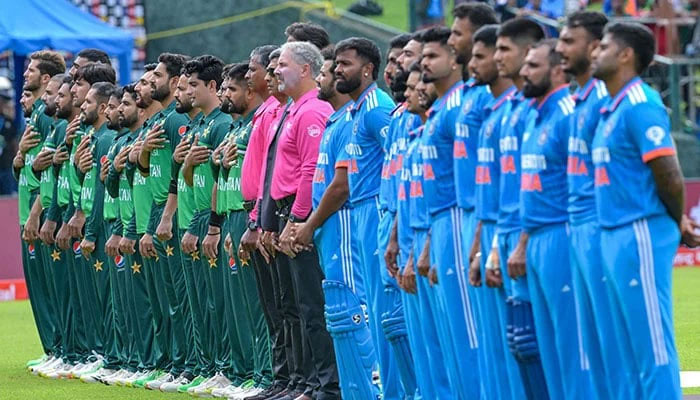India’s petty refusal
Thankfully, government and local sports bodies are not taking India’s bullying behaviour lying down
Only politics could spoil such a perfect comeback. On Sunday (November 10), a resurgent Pakistan cricket team, brimming with young talent, emphatically sealed an ODI series victory in Australia with an eight-wicket win in the final match. This is Pakistan’s first victory against an Australian team on the latter’s home turf in 22 years. Sadly, this historic victory had to share space with the fallout from India’s refusal to play in Pakistan during the upcoming ICC Champions Trophy 2025. It simply does not get more disrespectful than refusing to play in the host country during a major tournament. It is also just as unreasonable, especially considering that nearly every major cricket team, apart from India, has visited Pakistan in recent years without a hitch. In fact, the Indian minister for external affairs just concluded a visit to Pakistan a few weeks ago for the Shanghai Cooperation Organisation Summit. All of this proves that the country is more than capable of handling security for foreign dignitaries, delegations and sports teams, despite a recent resurgence in terror attacks. However, such justifications for Pakistan’s internal safety are superfluous when the reason for India’s refusal appears to have nothing to do with safety.
There is no denying that relations between India and Pakistan tend to be sour even at the best of times and have hit a new low since India’s illegal annexation of Kashmir in 2019. But to let politics intrude on a major international event is just not right. Particularly when one considers the fact that Pakistan has so graciously decided not to let India’s illegal annexation get in the way of the tournament. Thankfully, the government and local sports bodies are not taking India’s bullying behaviour lying down. Sources within the government have confirmed that Pakistan is prepared to withdraw from playing India in any international event, including the World Cup, unless it reciprocates by visiting Pakistan. The government has also decided to lobby against India’s bid to host the 2036 Summer Olympics, and has also decided to tell the PCB to reject any hybrid model for the Champions Trophy – even if it leads to financial penalties from the ICC.
Even though Pakistan’s firm stance against a commercial and economic behemoth like India is unlikely to yield much in terms of practical results, with a hybrid tournament still being the most likely solution to this one-sided impasse, claiming the moral high ground does count for something. It must also be noted that if India’s way of enjoying its newfound global primacy is to bully other countries and throw its weight around in international sporting bodies, doing so will only come at the cost of both sports and diplomacy. In case they have forgotten, the ICC Champions Trophy 2025 will be the first edition of the tournament since 2017, when Pakistan claimed the title. Cricket is a sport that is struggling for relevance in the 21st century and having two of its largest fan bases more concerned with whether the tournament will even take place than the outcome of the matches does not help the sport. Cricket needs a healthy India-Pakistan rivalry on the pitch and that means setting politics aside when it comes to sports.
-
 Kanye West's Best Songs: Fans Argue Over Bold Top 10 Ranking On Social Media
Kanye West's Best Songs: Fans Argue Over Bold Top 10 Ranking On Social Media -
 King Charles Secretly Relies On Advice From THIS Royal
King Charles Secretly Relies On Advice From THIS Royal -
 Jennifer Garner Reveals Beauty Choice She Makes As Botox Alternative In Her 50s
Jennifer Garner Reveals Beauty Choice She Makes As Botox Alternative In Her 50s -
 Kate Middleton Drops Four-word Message For Young Girl After Wales Visit
Kate Middleton Drops Four-word Message For Young Girl After Wales Visit -
 Shamed Andrew Uncensored ‘massages’ Should Be Refunded To Public
Shamed Andrew Uncensored ‘massages’ Should Be Refunded To Public -
 Kylie Kelce Reveals Rules She Wants Daughter Bennett To Learn At 3: No More 'passies'
Kylie Kelce Reveals Rules She Wants Daughter Bennett To Learn At 3: No More 'passies' -
 Smartphone Market Set For Biggest-ever Decline In 2026
Smartphone Market Set For Biggest-ever Decline In 2026 -
 Mud, Rain, Loincloths: All About Japan’s 200-year-old Harvest Wrestling Ritual
Mud, Rain, Loincloths: All About Japan’s 200-year-old Harvest Wrestling Ritual -
 Jonathan Majors Set To Make Explosive Comeback To Acting After 2023 Conviction
Jonathan Majors Set To Make Explosive Comeback To Acting After 2023 Conviction -
 Next James Bond: Why Jacob Elordi May Never Get 007 Role?
Next James Bond: Why Jacob Elordi May Never Get 007 Role? -
 Maddox Drops Pitt From Surname In Credits Of Angelina Jolie’s New Film 'Couture' Despite Truce From Father's End In Legal Battle
Maddox Drops Pitt From Surname In Credits Of Angelina Jolie’s New Film 'Couture' Despite Truce From Father's End In Legal Battle -
 Meghan Markle Adds Diamonds To Engagement Ring For Jordan Trip
Meghan Markle Adds Diamonds To Engagement Ring For Jordan Trip -
 Burger King Launches AI Chatbot To Track Employee Politeness
Burger King Launches AI Chatbot To Track Employee Politeness -
 Andrew’s Woes Amid King Charles’ Cancer Battle Triggers Harry Into Action For ‘stiff Upper Lip’ Type Dad
Andrew’s Woes Amid King Charles’ Cancer Battle Triggers Harry Into Action For ‘stiff Upper Lip’ Type Dad -
 Experts Warn Andrew’s Legal Troubles In UK Could Be Far From Over
Experts Warn Andrew’s Legal Troubles In UK Could Be Far From Over -
 Teyana Taylor Reflects On Dreams Turning Into Reality Amid Major Score
Teyana Taylor Reflects On Dreams Turning Into Reality Amid Major Score




